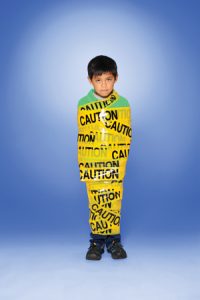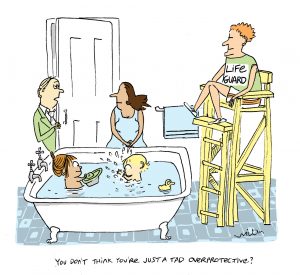 After my latest post on attachment, some of my friends expressed their concern on what would be crossing the line from attachment parenting to overprotection. They said maybe I was too concerned about my son`s emotions and would eventually end up spoiling him. Instead of dismissing my friends` concerns with “I know what I`m doing” – because, in fact, most of the time I don`t – I felt the need to clarify a few things about what it means to use attachment theory to make decisions as a parent. Bear in mind I only learned most of what I know about attachment very recently and I`m still learning about it. However, I am very interested in social psychology and really enjoy reading about it, which is part of the reason why the whole attachment thing made so much sense to me in the first place. Also, I`m a parent, not a scientist, so please don`t think I`m trying to know more than everybody else, I`m just sharing my experiences and what I learned. So here are the main points:
After my latest post on attachment, some of my friends expressed their concern on what would be crossing the line from attachment parenting to overprotection. They said maybe I was too concerned about my son`s emotions and would eventually end up spoiling him. Instead of dismissing my friends` concerns with “I know what I`m doing” – because, in fact, most of the time I don`t – I felt the need to clarify a few things about what it means to use attachment theory to make decisions as a parent. Bear in mind I only learned most of what I know about attachment very recently and I`m still learning about it. However, I am very interested in social psychology and really enjoy reading about it, which is part of the reason why the whole attachment thing made so much sense to me in the first place. Also, I`m a parent, not a scientist, so please don`t think I`m trying to know more than everybody else, I`m just sharing my experiences and what I learned. So here are the main points:
What it means to overprotect
The prefix “over” invokes a negative connotation, so the term itself suggests you`re crossing the line when it comes to protection. To my understanding, if you are overprotecting you are preventing your child from being independent, exploring and finding their own little adventures; probably because you are too afraid they might get hurt, physically or emotionally. I don`t believe that`s healthy, because the child will end up depending too much on the parent (or whoever is responsible for the child, if you don`t mind me stressing) and won`t learn resilience, which is utterly important for the child`s development.
That`s not what attachment is about. It`s about trying to understand the child`s needs and being there for them when they need you, so they can build their own confidence, learn about the world and let us worry about their safety – and that means making sure they feel safe. That`s where emotions come in; when children feel safe they learn more, build confidence and independence.
Parenting formula
There`s no such thing. Doubt anyone who claims you can follow certain instructions and it will work out for you and your child, at least most of the time. These claims end up leading parents to force a certain behaviour on their children and when it doesn`t work out they feel as though their children are not normal or that they did something wrong. That`s also not the point of attachment.
Every child is different and every parent is different. What works for some may not work for other people and if that sounds obvious, it`s because it is. It doesn`t mean it`s easy to get. Understanding what your child needs can be really hard (To be honest, I never heard anybody say it`s easy) and parents are constantly under pressure from family, friends, neighbours and people everywhere full of conflicting advice that might make them even more confused. It`s especially hard to know who to listen to, and how to listen to your child when you are sleep deprived, stressed and frustrated. I try to avoid judging parents while sharing my opinion and my experiences, but I understand it`s easier to identify what`s wrong rather than what`s better, or what can work. Even when you police yourself some judgement slips, especially on social media where people get braver than they would in a face-to-face conversation.
So even when people say there`s no formula they are quick to point out what`s right or wrong, which means they are following a set of rules. Forget that. Attachment is not about following instructions, it`s about adapting to your child`s needs; which means it`s going to be different for every parent, and every individual child, even siblings.
To illustrate that: if your child cries every time you put him/her down, I`d suggest you put him/her in a sling and go ahead with your routine. It would have worked for my son and it would have made my life easier. The problem is that I have a bad back and couldn`t carry him around. I had to reduce my work load in the house, do stuff when he was asleep or have people take care of him while I cooked and did housework. It wasn`t easy but he eventually grew out of it and didn`t need me so often.
I also planned to breastfeed my son until he was at least 24 months old, but by the time he was one, breastfeeding was making me tired and my nipples hurt as my son sometimes bites them. He eats his food very well so I managed to wean him out of the breast during the day without a lot of fuss. During the night, however, as I mentioned on my previous post, he wasn`t ready for giving up the breast. I`m still breastfeeding during the night, but I`m not tired anymore as it`s way less than when he was feeding on demand.
These are little adaptations considering my son`s needs, but also mine. I am making sacrifices, I`m having to adapt, and that`s ok. And it wasn`t easy to get to these decisions, I struggled to understand these were things I could do, but I got there, not following a set of rules, but connecting with my child. He`s only one, though, I still have a long way to go.
Follow your instincts/intuition
Mothers have this reputation of having great intuition, being so connected with their instincts; it`s like they always know what to do, right? I hate this assumption. It makes me feel, when I don`t know what to do, that my motherly radar is broken; my psychic powers worn out. As Stuart Sutherland points out in his book “Irrationality” (it`s mostly on social psychology, but goes way beyond that; I highly recommend it): “Many people find it more hurtful to be accused of having poor intuition than of being slovenly, lazy or selfish”. He also shows us, through a number of social experiments, that more often than not, our intuition is wrong. So when you hear “Just follow your intuition and you`ll be fine”; that`s an irrational advice.
You are not a bad parent for not knowing what to do or for doing something that didn`t really work. Making mistakes and being confused is a big part of being a parent. I used to think I could be in tune with my instincts and my feelings and that would be all I needed as a parent. That was before I became a parent.
Scientific studies can help a lot. Don`t feel overwhelmed by them, there are a lot of people turning them into easy-to-understand articles and books, so we can make sense of them. Again, it doesn`t mean there is a formula. I`m not suggesting scientific parenting is a thing. You still have to make decisions based on your particular situation, but I believe in informed decisions. The more you know, the more confident you are as a parent. And that makes a big difference.
Using the same example as above, about babies who cry every time you put them down. My son was like that and it didn`t feel right to let him cry, but also, I needed to eat and do my own stuff, so my instincts were in conflict here. I didn`t know if I should let him cry a bit and if that would make him learn to be more independent or if I should always comfort him. Then I came across a bunch of studies – which are also mentioned in “Irrationality”, I later found out – showing that the more you leave a baby crying the more they cry. They will cry more often if they don`t feel safe, if you don`t pick them up when they call; they instinctively do it. So I figured there was no point fighting it. I picked my son up when he cried and that worked out for him and for me, as I didn`t have to hear him cry much. That`s also in attachment theory.
And if you think that`s overprotecting or spoiling a child, I must add that there`s no evidence whatsoever that ignoring a crying baby is good for them. You might still dispute me on that, but because scientific data is on my side, I`m confident on my decision, so I won`t feel bad about it. Informed decisions will make you happier, too.
Again, I must stress, it doesn`t mean we`ll always make the same decisions and that we`re acting right or wrong. Knowing the science behind attachment and child development just helps and, as a parent, I`ll use all the help I can get.
I ordered a couple of books I`ll link down below. I figured if my life became so much easier once I understood the very basics of attachment theory, then I ought to learn more.
Books I ordered:
Books I recommend (they are not on attachment but helped me a lot):

